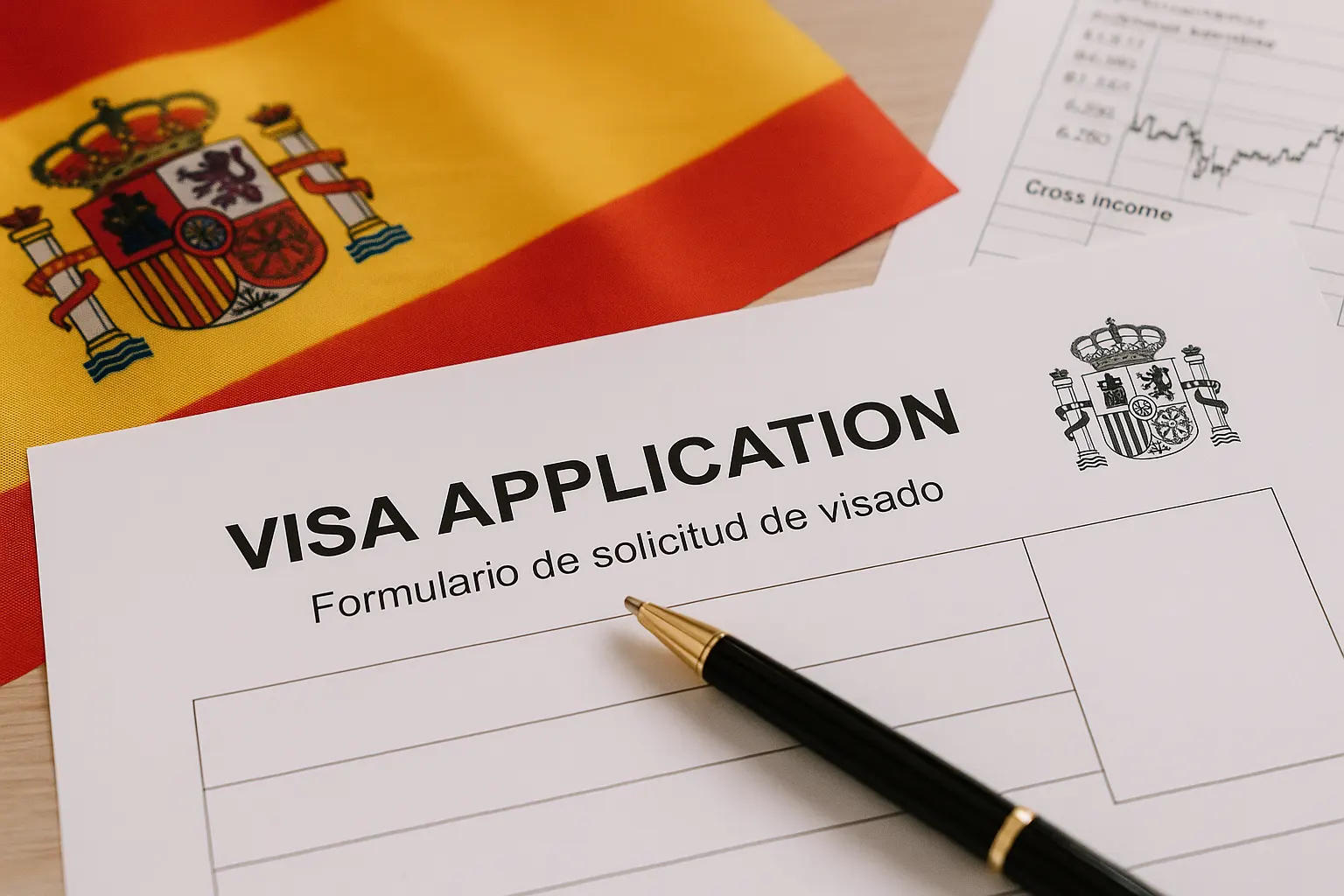The trend of moving to Spain from Canada has seen notable growth in recent years. Factors such as Spain’s appealing climate, rich culture, and comparatively affordable lifestyle attract Canadians seeking a change of pace or new opportunities abroad. This migration wave brings with it unique challenges and opportunities in relocating from Canada to Spain.
Understanding both the legal requirements and cultural dynamics is essential before undertaking this life-changing move. Navigating Spain’s immigration laws demands clarity on visa types, residency permits, and timelines for permanent settlement. Simultaneously, adapting to Spanish customs and language plays a crucial role in successful integration.
Canadians considering relocation benefit greatly from thorough preparation that encompasses:
- Knowledge of entry regulations and residency pathways
- Awareness of employment prospects and financial obligations
- Readiness to embrace cultural differences and social norms
This foundation ensures a smoother transition and empowers newcomers to build fulfilling lives within vibrant Spanish communities.
Understanding the Legal Framework for Moving to Spain from Canada
Canadians enjoy visa-free travel to Spain for short stays up to 90 days within any 180-day period. Starting in 2024, entry under this allowance will require prior authorization through the European Travel Information and Authorization System (ETIAS). This new electronic system is designed to enhance security and streamline border control, but it is essential to apply for ETIAS authorization before embarking on the trip.
For Canadians planning to stay beyond 90 days, a visa application process at the Spanish Embassy or Consulate in Canada becomes necessary. Appropriate visas depend on the purpose of stay—work, study, entrepreneurship, or retirement. The application typically involves submitting documentation such as proof of income, health insurance, and criminal background checks. Securing the correct visa before arrival prevents complications with legal residency.
Upon entering Spain with a valid long-stay visa or after obtaining residence status, newcomers must register with local authorities to receive two critical documents:
- Foreigner Identity Card (TIE): A physical card proving legal residence.
- NIE Number: A Foreigner Identification Number required for administrative procedures including opening bank accounts and signing rental contracts.
Permanent residency eligibility arises after five years of continuous legal residence. During this time, absences from Spain should be minimal to maintain uninterrupted residency status. Achieving permanent residency grants expanded rights such as easier access to social services and employment flexibility.
Understanding these legal requirements is fundamental for Canadians aiming to establish themselves successfully in Spain without facing bureaucratic setbacks.
Exploring Visa Options Available to Canadians Moving to Spain
Canadians seeking to move to Spain face several visa pathways tailored to different needs and ambitions. Understanding the specific conditions and benefits of each visa type is crucial for a smooth relocation process.
Digital Nomad Visa
The Digital Nomad Visa caters specifically to remote workers employed by companies outside Spain who wish to reside legally in the country. This visa allows Canadians to live in Spain while continuing their work remotely. Key points include:
- Proof of employment with a foreign company.
- Demonstration of sufficient income to support living expenses.
- Health insurance coverage valid in Spain.
- Validity typically ranges from one year, with options for renewal.
This option aligns well with the growing trend of flexible work arrangements, eliminating many barriers associated with traditional work permits.
Entrepreneur Visa
For Canadians aiming to start a business or invest in innovative projects within Spain, the Entrepreneur Visa offers a pathway. Requirements generally involve:
- Submission of a detailed business plan illustrating economic viability and innovation.
- Evidence of financial means to support the business venture.
- Approval from relevant Spanish authorities assessing the potential impact on local economy and job creation.
This visa enables holders not only to reside but also to actively manage their enterprise in Spain.
Non-Lucrative Residence Visa
Another significant option is the Non-Lucrative Residence Visa, designed for individuals who wish to reside in Spain without engaging in local employment. Conditions include:
- Proof of sufficient financial resources.
- Ability to work remotely for foreign companies without entering the Spanish labor market.
- Health insurance coverage.
This visa suits retirees or independent remote workers who prioritize lifestyle over local employment.
Considerations on Moving Costs and Regrets
The moving to Spain from Canada cost varies depending on visa type, legal fees, and living expenses during initial settlement. Consulting specialized immigration lawyers can clarify these costs upfront. Some expats express concerns about regret moving to Spain from Canada, often linked to underestimated bureaucratic challenges or cultural adaptation difficulties. Proper preparation around visa selection mitigates such risks significantly.
Each visa option entails specific documentation and procedural steps that benefit from expert legal guidance. Selecting the most appropriate permit depends on individual circumstances, professional goals, and long-term plans within Spain.
The Immigration Process Step-by-Step for Canadian Expats
Moving to Spain from Canada involves a well-defined, yet complex immigration process that requires thorough preparation and understanding. Each applicant’s situation is unique, making personalized case analysis essential. Bilingual legal teams based in major Spanish cities such as Barcelona play a crucial role in guiding applicants through the steps, ensuring compliance with local regulations.
Preparing Documentation
Applicants must compile specific documentation tailored to their visa type. Commonly required documents include:
- Proof of income: Demonstrates financial self-sufficiency.
- Health insurance: Valid coverage recognized in Spain.
- Criminal background checks: Ensures good legal standing.
- Proof of accommodation: Confirms residence arrangements within Spain.
Proper organization and timely submission of these documents reduce delays and complications.
Role of Immigration Lawyers and Digital Platforms
Specialized immigration lawyers, such as those at NIM Immigration Lawyers, provide expert advice personalized to Canadian expats. Their services include:
- Detailed case evaluations considering individual circumstances.
- Assistance with electronic file management, eliminating the need for physical visits.
- Continuous communication via online platforms to clarify doubts and update on progress.
Digital platforms streamline the application process, offering transparency and efficiency rarely achieved by traditional methods.
Timeline Expectations
The immigration timeline varies depending on visa type and documentation completeness but generally follows this sequence:
- Initial consultation and case analysis: 1-2 weeks.
- Document preparation and submission: 2-4 weeks.
- Processing by Spanish authorities: Approximately 1-3 months.
- Issuance of residence permit and NIE number: Final stage enabling legal residency and access to public services.
Delays can occur due to incomplete paperwork or processing backlogs; professional guidance helps mitigate these risks.
Understanding each step enhances preparedness for Canadians planning their relocation journey to Spain, making the transition smoother and legally compliant.
Financial Considerations When Moving from Canada to Spain
Moving to Spain from Canada involves several financial factors that require careful planning. Understanding the estimated costs involved in visa applications and relocation expenses is essential for a smooth transition.
Visa Application and Relocation Expenses
Costs associated with visa applications and the process of relocating to Spain include:
- Visa Fees: Costs vary by visa type. For example, non-lucrative residence visas typically require proof of financial means, with minimum thresholds around €27,000 per year for the applicant, plus additional amounts per dependent.
- Travel Costs: Airfare between Canada and Spain fluctuates seasonally but should be budgeted as part of initial expenses.
- Relocation Expenses: Includes shipping belongings, temporary accommodation upon arrival, and initial living costs before securing local employment or income streams.
Financial Thresholds for Residence Visas
Spain sets specific financial requirements depending on visa categories:
- Non-Lucrative Visa: Requires demonstration of sufficient funds to support oneself without working in Spain. The minimum monthly income is generally set at approximately 400% of the IPREM (Public Income Index), equating to about €2,400 per month.
- Entrepreneur Visa: Applicants must present a viable business plan with investment capital; exact financial thresholds depend on the business model and regional authorities.
- Digital Nomad Visa: Proof of remote employment and income stability is needed, with minimum earnings typically aligning with Spanish average wages.
Tax Implications for New Residents
Becoming a Spanish tax resident usually means spending more than 183 days a year in Spain or establishing the main economic interests there. Key tax considerations include:
- Spanish Personal Income Tax (IRPF): Progressive rates apply up to 47% depending on income level.
- Wealth Tax: Applies to net assets exceeding regional thresholds; some exemptions apply.
- Canadian Tax Obligations: Canadian citizens may remain liable for certain taxes or reporting requirements, such as those related to foreign income or property.
Engaging tax advisors specializing in Spanish taxation laws provides clarity on:
- Double taxation treaties between Canada and Spain that prevent overlapping tax liabilities.
- Strategies for optimizing tax residency status.
- Compliance with both Spanish and Canadian fiscal regulations.
Expert advice ensures compliance while minimizing unexpected burdens during this complex financial transition.
Employment Opportunities and Work Permits for Canadian Citizens in Spain
Canadian citizens face certain challenges when seeking employment in Spain’s competitive labor market. The demand for jobs often exceeds supply, especially in sectors requiring fluency in Spanish or specialized qualifications recognized locally. Language barriers and differing professional standards can limit access to many traditional roles.
Employment Opportunities by Visa Type
Employment opportunities depend heavily on the type of visa held:
Work Permit Visa
To work directly for a Spanish employer, Canadians must secure a job offer that aligns with Spain’s shortage occupation list or qualify as a highly skilled professional earning above €41,000 annually. Applicants must navigate complex bureaucratic processes involving employer sponsorship and labor market tests.
Legal Requirements for Work Permits
Legal requirements for all these permits include:
- Valid passport and background checks.
- Proof of financial means or employment contract.
- Health insurance covering Spain.
- Registration with local authorities upon arrival.
Job Opportunities for Canadians in Spain
Jobs in Spain for Canadian citizens vary across industries such as IT, tourism, education (especially English teaching), and international trade. Entrepreneurs often find opportunities in technology startups, hospitality, and consulting services tailored to expat communities.
Importance of Understanding Visa Conditions
Understanding the specific visa conditions is essential for legal employment or business operation. Accessing expert advice from immigration lawyers familiar with Spanish labor laws streamlines this process, ensuring compliance and improving chances of success under the appropriate work permit category.
Living and Integrating into Spanish Culture as a Canadian Expat
Adapting to life in Spain involves more than legal formalities; it requires understanding cultural nuances and practical daily adjustments. The cost of living comparison between Canada and popular Spanish cities such as Madrid and Barcelona reveals significant differences, especially in housing and daily expenses. Canadians moving to Spain often find rent substantially lower, with options ranging from modern apartments in city centers to more affordable housing in suburban areas. Daily expenses like groceries, transportation, and dining tend to be less costly, though lifestyle choices impact the budget.
Understanding Cultural Differences
Cultural differences play a pivotal role in integration. The siesta tradition, characterized by an afternoon break, affects business hours and social rhythms. Newcomers should prepare for this relaxed pace alongside vibrant community life marked by festivals, tapas culture, and outdoor socializing. Engaging with these traditions fosters a deeper connection to local society.
Importance of Language Proficiency
Language proficiency emerges as essential. Learning Spanish goes beyond communication; it unlocks access to public services, healthcare, education, and employment opportunities. It also eases navigation through administrative processes requiring interaction with government entities.
Building Social Networks
Building social networks is crucial for emotional well-being and practical support. Expats benefit from connecting with established expat communities and local groups that organize cultural events, language exchanges, and networking opportunities. These interactions help overcome initial isolation and create a sense of belonging.
Adapting successfully means embracing both the practical realities of costs and the rich cultural tapestry that defines daily life in Spain for Canadian newcomers.
Healthcare Access and Social Services for Canadian Residents in Spain
Accessing healthcare and social services in Spain requires meeting specific eligibility criteria, with proper documentation playing a crucial role. The NIE number (Número de Identificación de Extranjero) is a key identification document that foreign residents, including Canadians, must obtain to interact with various public systems.
Eligibility Criteria for Public Healthcare Access
- Registration with the Spanish social security system is mandatory for eligibility.
- Canadians working or legally residing in Spain can register through their employer or as self-employed individuals.
- Once registered, access to Spain’s comprehensive public healthcare system becomes available, covering primary care, specialist visits, hospital treatments, and emergency services.
- Family members legally residing in Spain may also benefit from coverage under the primary registrant’s social security.
Importance of the NIE Number
- The NIE number serves as an official identifier required for registering with social security.
- It facilitates enrollment in healthcare services, opening bank accounts, signing rental contracts, and completing tax obligations.
- Without the NIE number, accessing these essential public services becomes complicated or impossible.
Necessity of Private Health Insurance
- During the initial months of residence or before social security affiliation is completed, private health insurance is often necessary.
- Certain visa types, such as the Non-Lucrative Visa or Digital Nomad Visa, require proof of private health insurance coverage as part of their application process.
- Private insurance provides peace of mind by covering medical costs when public healthcare access is not yet available.
Proper management of documentation and timely registration with social security ensures that Canadian expats can fully utilize Spain’s high-quality public healthcare services. This system offers significant benefits compared to many other countries but relies heavily on legal compliance and administrative procedures.
Common Mistakes Canadians Make When Moving to Spain and How to Avoid Them
Moving to Spain from Canada involves navigating a complex set of legal, financial, and cultural challenges. Awareness of common pitfalls can prevent costly errors and delays.
1. Not understanding the full scope of visa requirements
Not understanding the full scope of visa requirements often leads to illegal stays or rejected applications. Many newcomers assume short-term visa-free entry covers longer stays, but exceeding 90 days without the appropriate residence permit risks fines or deportation. Preparing for visa appointments with complete documentation is essential. Missing paperwork or failing to meet specific criteria can stall the process indefinitely.
2. Underestimating financial requirements or tax responsibilities
Underestimating financial requirements or tax responsibilities causes unexpected costs. Spain’s tax system includes personal income tax and wealth tax obligations that differ significantly from Canadian taxation rules. Lack of consultation with specialists familiar with Spanish law may result in penalties or double taxation issues.
Seven critical mistakes frequently encountered include:
- Ignoring language acquisition, which hampers social integration and limits access to healthcare, banking, and government services.
- Delays caused by incomplete documentation or absence of professional legal advice.
- Overlooking the need for a NIE (Número de Identidad de Extranjero) number early in the process.
- Failing to understand residency timelines and renewal obligations.
- Misjudging housing market complexities and rental contract legalities.
- Neglecting to verify health insurance coverage requirements under Spanish law.
- Assuming work authorization comes automatically with residence permits when separate permits may be required.
Engaging bilingual legal experts experienced in Spanish immigration law mitigates these risks by providing personalized case analysis, ensuring compliance with evolving regulations, and expediting procedures efficiently.
Is It Worth Moving to Spain from Canada? Weighing Pros and Cons
Deciding whether moving to Spain from Canada is worthwhile depends on multiple factors that affect lifestyle, finances, and legal complexities. Many Canadians are drawn by advantages including better climate year-round compared to many parts of Canada. Spain offers mild winters and warm summers, which significantly enhances outdoor living and recreational opportunities.
A lower cost of living enhancing lifestyle options especially housing affordability attracts expats seeking quality of life improvements. Cities like Valencia or Málaga provide a comfortable standard of living at a fraction of Canadian urban costs, while still offering vibrant cultural scenes.
Healthcare access ranks highly in favor of relocating. Once registered as a resident, Canadians gain entry to Spain’s high-quality healthcare system, known for its comprehensive coverage and efficiency. This benefit often offsets initial bureaucratic challenges encountered during the immigration process.
Potential difficulties include navigating complex administrative requirements. The immigration journey demands careful preparation due to bureaucratic hurdles during the immigration process such as visa applications, residence permits, and tax registrations. Delays or misunderstandings can arise without professional guidance.
Employment prospects may also influence the decision. While certain visas simplify work permit acquisition, competition in Spain’s labor market requires realistic expectations for job seekers.
Asking “is it worth moving to Spain from Canada?” involves balancing these factors: climate benefits, cost savings, healthcare quality against legal procedures and employment challenges. Assessing personal priorities alongside expert advice ensures informed decisions when considering how hard is it to move to Spain from Canada.
Conclusion
Moving to Spain from Canada involves navigating a complex legal process that benefits greatly from professional help. Expert immigration lawyers specializing in Spanish law, particularly those offering online services, provide critical support throughout the immigration journey. Their personalized advice and thorough case analysis increase the likelihood of a successful move, whether seeking residency, citizenship, or pursuing future plans abroad.
Building a life in Spain requires embracing cultural differences and actively engaging with vibrant Spanish communities. Language acquisition and integration efforts enhance social connections and access to public services.
Key advice for Canadians considering this relocation experience:
- Conduct thorough research on visa requirements and legal procedures before applying.
- Prepare for a multi-step process that demands patience and attention to detail.
- Seek out a trusted legal team providing continuous guidance and electronic file management to streamline your application.
The challenge of how hard is it to move to Spain from Canada becomes manageable with the right support, clear planning, and realistic expectations.














